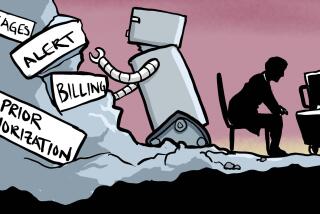Health letters: Doctor’s reassuring touch aids heart patient
- Share via
Your article [“What a Touch Can Do,” Oct. 24] really hit a chord with me. In 1998, I was struck with a massive heart attack that put me in a hospital for the first time in my life.
It was finally determined that I needed surgery. I was scared stiff and heard very little of what the doctor was saying. He knew this, and he took my hand in his and held it while he explained. It was like a shot in the arm.
I remember very little of what he said or even what he looked like. That touching reassurance is what convinced me (and my wife) that this was the man who was going to make me well.
George A. Weinstock
Calabasas
::
I pray to God no one ever gives me a robot pet for “comfort,” no matter how old and sick I am. In fact, I am grateful for your article [“Engineered to Heal,” Oct. 17], so I can put that stipulation in my advance directive. I just hope my wishes are respected.
No matter how “cute” they may appear to some, mechanical simulations of pets (or stuffed animals, for that matter) are not living creatures and do not have a soul. Such a so-called pet would be emotionally devastating to me and bring indescribable despair. Just reading the article and viewing the photo makes me feel like crying.
A society that cannot provide human and, when possible, animal companionship to shut-ins needs a serious overall. What has happened to us?
Loren Reichman
Los Angeles
::
Fifteen months ago, I had Da Vinci robotic-assisted surgery to remove a uterine fibroid the equivalent size of a 20-month pregnancy [“Da Vinci Gets Popular, But Is It Artistic?” Oct. 17]. I have five small incisions, walked the same day, vacationed on the beach in 10 and now am in great physical shape with a healthy core. I shudder to think how different my case would have been with a traditional abdominal incision.
Heidi Simmons
Palm Springs
::
We are pleased to see industry developing innovative nonanimal testing methods [“New Product Tests Spare the Animals,” Oct. 10]. Such modern testing methods not only spare countless animals from being force-fed toxic chemicals, crammed into restraint tubes to inhale poisonous vapors or burned as corrosive substances are applied directly to their shaved skin, but they also save taxpayer funds and yield results in a fraction of the time that an animal experiment would take. It’s encouraging that government agencies are taking note of the revolution that has occurred over the last quarter century in our understanding of biology and are applying that knowledge to protecting both humans and animals.
Jabeen Akhtar
Research associate, regulatory testing division
People for the Ethical Treatment of Animals
Norfolk, Va.
::
Although I am the medical director of a blood center, I write to you today in my personal capacity to raise certain issues about your story [“Lift Ban on Gay Blood Donors?” Oct. 10].
The justification for the proposed change is that we don’t want to hurt the feelings of certain people; so, in order to make a minority feel better, some propose to put the entire country at risk. Hardly compelling.
Furthermore, what shall we say to those who will contract the disease unnecessarily? The same numbers that are cited to “prove” the safety of the proposed change clearly show that a small number of people undoubtedly will be infected due to this change if it is implemented. The ethics of the proposed change are being ignored in this debate, and that is regrettable.
Norman D. Means, MD
Anchorage, Alaska






